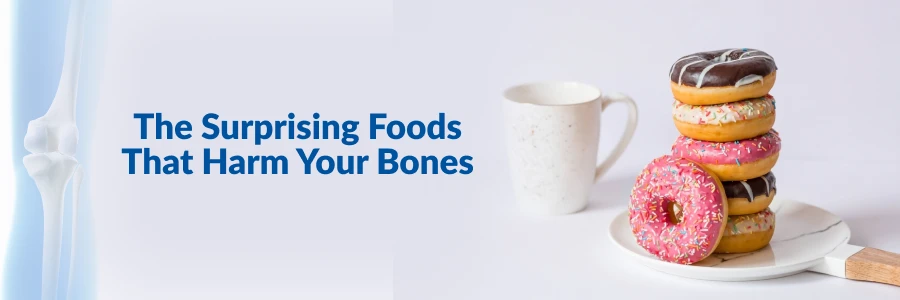Categories
- Cardiology 84
- Dermatology 45
- Endocrinology 33
- ENT 16
- Fertility 190
- Gastroenterology 78
- General-Medicine 81
- Gynecology 80
- Hematology 19
- Infectious-Diseases 33
- Neurology 52
- Oncology 34
- Ophthalmology 23
- Orthopedics 69
- Pediatrics 31
- Procedure 23
- Public-Health 144
- Pulmonology 59
- Radiology 8
- Urology 68
- Wellness 161
- Woman-and-child 77

The Surprising Foods Bad for Bone Health
When it comes to bone health, the first and foremost thing is to increase your daily calcium intake. But this does not mean that meeting your daily calcium requirements alone makes your bones stronger. Although most bone growth occurs in childhood and adolescence, it is important to take care to maintain bone health, as bone loss begins in your mid-thirties.
Healthy bones are made from the little diet decisions you make throughout the day. What we eat and what we don't make a big difference in bone health. Therefore, diet can make bones better or worse. Since foods rich in calcium and vitamin D help strengthen bones, there are also some foods that can weaken bones.
Secure your health with a second opinion. Make informed decisions and book your appointment today!
Get A Second OpinionFoods Bad for Bone Health:
- Salty Foods: High salt intake increases calcium loss, leading to osteoporosis, limit salty foods and choose low-salt options for better bone health.
- Foods Rich in Iron: Excess iron interferes with calcium absorption and can cause bone loss avoid combining iron-rich foods with calcium-rich foods.
- Carbonated Drinks: High phosphoric acid in sodas increases blood acidity, causing calcium loss from bones and decreasing bone mineral density.
- Sugary Snacks: High sugar intake reduces bone mass and increases the risk of osteoporosis, opt for moderate amounts of natural sugars.
- Foods Rich in Protein: Excess protein, especially from animal sources, leads to calcium stress and weaker bones, consuming necessary amounts of protein to maintain balance.
- Caffeine: High caffeine intake lowers calcium absorption and weakens bones, increasing fracture risk, limit caffeine to less than 400 mg daily.
- Spinach: Oxalates in spinach block calcium absorption, reducing its availability to the body, pair spinach with easily absorbed calcium-rich foods like cheese.
Ready to take control of your health journey? Book your appointment now and start your path towards wellness today!
Book an AppointmentConclusion:
Understanding the impact of dietary choices on bone health is vital for maintaining strong and healthy bones throughout life. By limiting consumption of salty foods, sugary drinks, alcohol, caffeine, high-protein diets, and carbonated beverages, you can support bone density and reduce the risk of osteoporosis. Incorporate calcium-rich foods and maintain a balanced diet to optimize bone health for the long term.
Frequently Asked Questions
Sugary drinks, like soda, can take calcium out of your bones, making them weaker.
Your body can lose calcium, which is necessary for strong bones, if you eat too much salt.
Drinking a lot of coffee or tea can make it harder for your body to keep calcium in your bones.
Yes, drinking too much alcohol can make your bones weaker and more likely to break.
Yes, eating too much red meat, processed foods, and foods with too much phosphorus (like some sodas) can also be bad for your bones.
Consume meals high in vitamin D and calcium, like milk, cheese, yogurt, leafy greens, and fish. Exercise regularly and get enough sunlight.

Categories
- Cardiology 84
- Dermatology 45
- Endocrinology 33
- ENT 16
- Fertility 190
- Gastroenterology 78
- General-Medicine 81
- General 6
- Gynecology 80
- Hematology 19
- Infectious-Diseases 33
- Neurology 52
- Oncology 34
- Ophthalmology 23
- Orthopedics 69
- Pediatrics 31
- Procedure 23
- Public-Health 144
- Pulmonology 59
- Radiology 8
- Urology 68
- Wellness 161
- Woman-and-child 77